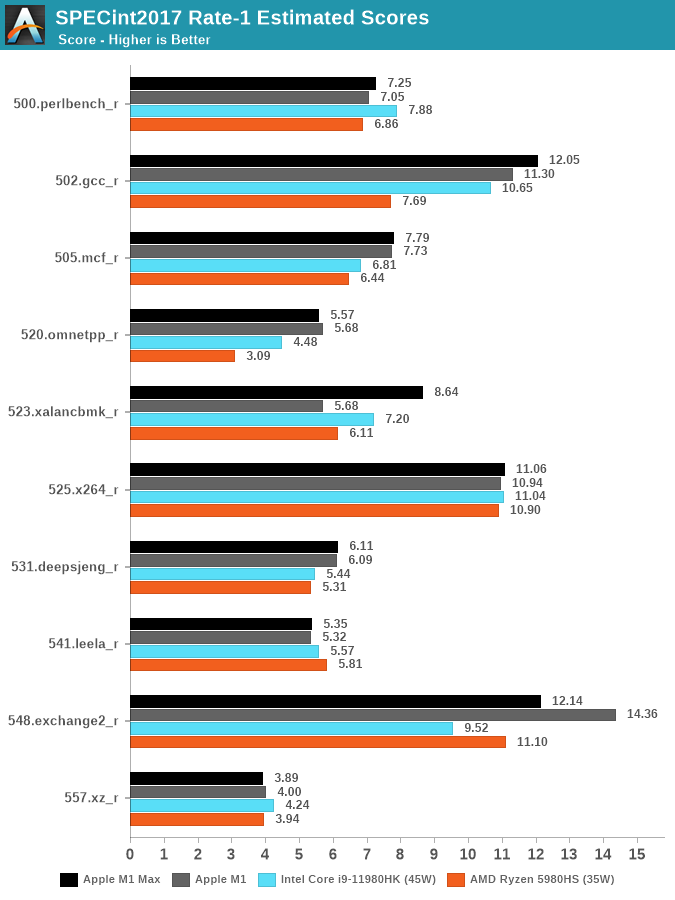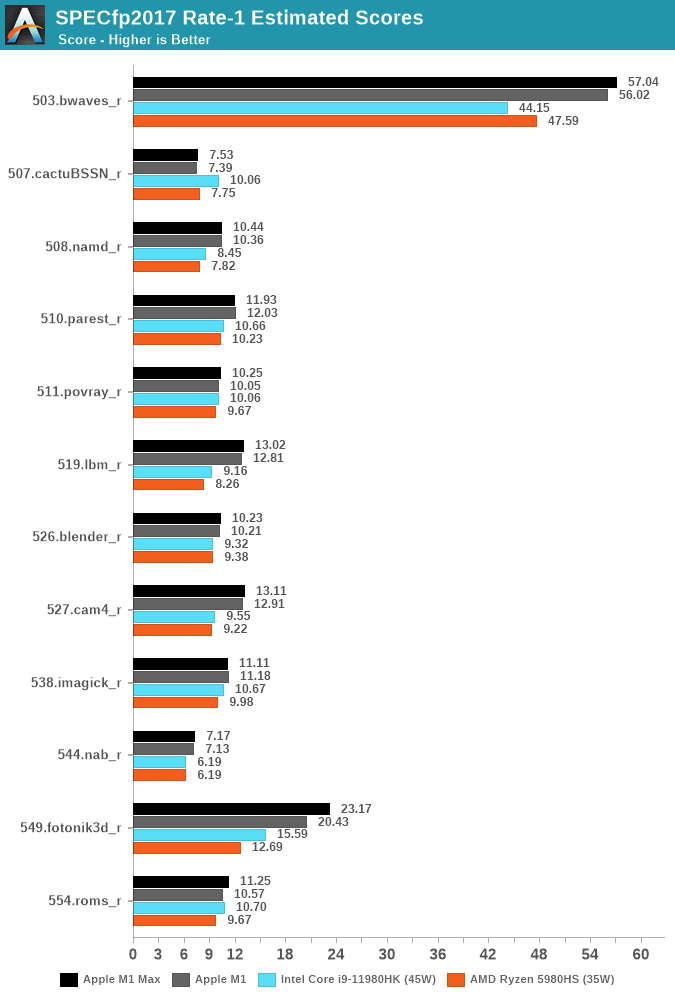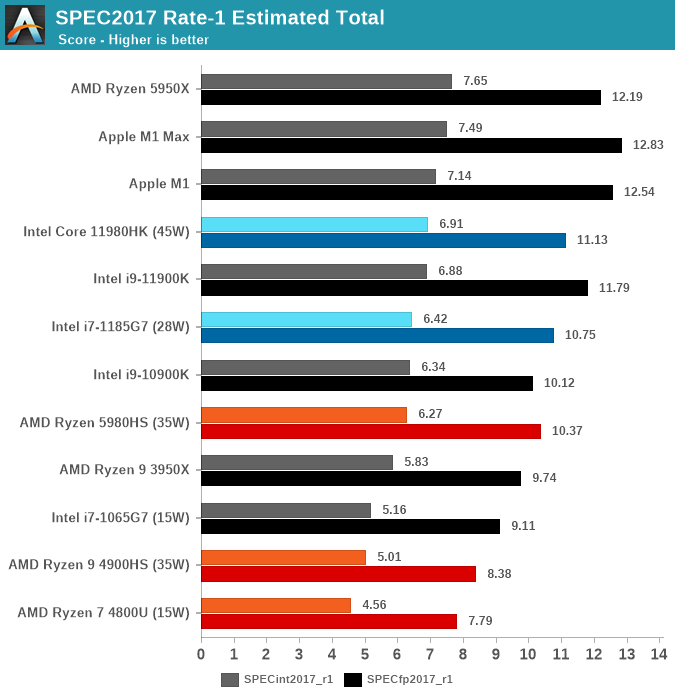Apple's M1 Pro, M1 Max SoCs Investigated: New Performance and Efficiency Heights
by Andrei Frumusanu on October 25, 2021 9:00 AM EST- Posted in
- Laptops
- Apple
- MacBook
- Apple M1 Pro
- Apple M1 Max
CPU ST Performance: Not Much Change from M1
Apple didn’t talk much about core performance of the new M1 Pro and Max, and this is likely because it hasn’t really changed all that much compared to the M1. We’re still seeing the same Firestrom performance cores, and they’re still clocked at 3.23GHz. The new chip has more caches, and more DRAM bandwidth, but under ST scenarios we’re not expecting large differences.
When we first tested the M1 last year, we had compiled SPEC under Apple’s Xcode compiler, and we lacked a Fortran compiler. We’ve moved onto a vanilla LLVM11 toolchain and making use of GFortran (GCC11) for the numbers published here, allowing us more apple-to-apples comparisons. The figures don’t change much for the C/C++ workloads, but we get a more complete set of figures for the suite due to the Fortran workloads. We keep flags very simple at just “-Ofast” and nothing else.

In SPECint2017, the differences to the M1 are small. 523.xalancbmk is showcasing a large performance improvement, however I don’t think this is due to changes on the chip, but rather a change in Apple’s memory allocator in macOS 12. Unfortunately, we no longer have an M1 device available to us, so these are still older figures from earlier in the year on macOS 11.
Against the competition, the M1 Max either has a significant performance lead, or is able to at least reach parity with the best AMD and Intel have to offer. The chip however doesn’t change the landscape all too much.

SPECfp2017 also doesn’t change dramatically, 549.fotonik3d does score quite a bit better than the M1, which could be tied to the more available DRAM bandwidth as this workloads puts extreme stress on the memory subsystem, but otherwise the scores change quite little compared to the M1, which is still on average quite ahead of the laptop competition.

The M1 Max lands as the top performing laptop chip in SPECint2017, just shy of being the best CPU overall which still goes to the 5950X, but is able to take and maintain the crown from the M1 in the FP suite.
Overall, the new M1 Max doesn’t deliver any large surprises on single-threaded performance metrics, which is also something we didn’t expect the chip to achieve.










493 Comments
View All Comments
noone2 - Tuesday, October 26, 2021 - link
The laptop will be worthless and insanely outdated by the time and SSD dies, making it irrelevant even if that was the case.flyingpants265 - Sunday, October 31, 2021 - link
What an extremely dumb comment. Old Macbooks aren't worthless, they hold their value extremely well. If you use the Mac for what it's intended (video work) it's possible that you'll do damage to the drive.You really are an absolute idiot if you think there's an excuse for soldering SSDs. It's like welding in the suspension on your car because "the car will be worthless and outdated". No. They have a limited lifespan and need to be replaced when they die.
varase - Wednesday, November 3, 2021 - link
Then you take it in and have the logic board traded for a refurbished one, then restore your data.Anyone who doesn't take off-computer backups is an idiot and is deserves to lose data whether it sits on a HDD or SSD.
All drives fail eventually. I have at least two backups of everything, including my ginormous disk array. And when your replaceable SSD dies, it will take everything with it too.
coolfactor - Tuesday, October 26, 2021 - link
I'm typing this on a 2013 MacBook Air. 8 years and going strong. You chose "3000 writes" to sound dramatic, but that's the low end of low-end SSDs, none of which are used in Macs. SSDs can be rated up to 100,000 writes, and Samsung even promotes some of theirs as lasting 10 years under heavy usage. So your argument is weak, sorry.AshlayW - Tuesday, October 26, 2021 - link
Just as anecdotal as your emotional reply to defend your product/purchase decision. Look up Louis Rossmann on YT if you want to know what kind of company you are supporting.caribbeanblue - Saturday, October 30, 2021 - link
Unfortunately, these MacBooks are the best laptops on the market. Repairability is only part of the story, and the repairability of a device isn't just about ease of repair that is enabled by hardware design choices, it's also about the company providing board-level schematics to 3rd party repair shops, so users can have access to cost friendly genuine repair. Apple does have a long way to go in that aspect, that is true, however they *definitely* should not be forced to not solder down their SSD or DRAM. Soldering down such components earn you big improvements in terms of performance, energy efficiency, and space savings. If you want a laptop with a socketed RAM & removable SSD, then that's fine, buy something else, but don't act like MacBooks don't have any selling points, you would be delusional for thinking that.varase - Wednesday, November 3, 2021 - link
Louis Rossmann is a religious zealot.He's a repair gnome, not an innovator or designer.
UnNameless - Wednesday, November 17, 2021 - link
LR sadly became a jest! A joker filled with hate! I respected him a lot back in the days he mostly had content on repair stuff! I also agree with him about the Right to Repair and most of the issues regarding Mac stuff repairs! But his war for RtoR became a crusade and went nuts in the last year or so when he also started to bash Apple on software stuff and practically everything he can find awful! And I wouldn't have said nothing if he'd be an informant software guy, but he's an repair engineer, a good one and he should have sticked with that! From the fiascos with the Apple services and firewall whitelists, to the Apple OCSP so poorly misunderstood by him and even worse presented, to Apple hashing etc. Ever since he became a couch diva with that freaking cat, instead a shop repair guy...his true colors and hate towards just oozed so smoothly from his skin!RealAlexD - Monday, November 1, 2021 - link
3000 writes are actually a pretty good durability for a pro consumer SSD. While it is true, that some SSDs are rated for up to 100k writes, those are SLC devices, which are not really used anymore outside of special cases (Samsung Z-NAND). Normal SDDs will either have TLC or QLC Flash cells (or maybe 2bit MLC, but even Samsung Pro SSDs are now TLC), which don't last nearly as long.The TLC SSD with the most writes I could find was a Seagate Nytro Write intensive Server SSD, than promises about 20k writes.
Also conditions effect the number of writes a Flash cell will survive, here running warmer actually can increases lifetime. And the advertised durability is a worst case durability.
UnNameless - Wednesday, November 17, 2021 - link
I agree! Been using my iMac Pro from 2018 till present! Before I started earlier this year my little experiment with Chia plotting, which is known to burn up SSDs like nothing else, I had 99% lifetime drive left in my 1TB SSD. Even before I ran my experiment, I tried to search online to find what kind of nand flash the iMP uses but couldn't find any real concrete stuff as Apple has customs chips in those SSDs. So I took it for a spin and in the course of weeks I wrote in excess of 1PB of data! SSD lifetime dropped from 99% to 86%. If this scales linearly, I reckon you'd have to write in excess of 10PB of data on a 1TB SSD to bring it to critical levels or burn it completely! And I have never heard of anyone that does such a thing!